- Home
- Janice Kay Johnson
Back Against the Wall Page 15
Back Against the Wall Read online
Page 15
With regret—yep, there was that word—Tony had instructed Beth to go ahead digging through the boxes in the backyard. He had sent an officer to help her and to be present if she found anything of interest. He’d decided he had greater priorities—and that he had to trust her.
He had also asked which of her parents’ friends had called her after hearing she’d found her mother’s body.
“Debra Abernathy, which isn’t any surprise,” she’d said promptly. “The others were Michael Longley and Tim Oberholtzer. Mr. Oberholtzer said he’d talked to Dad but hadn’t gotten a good idea of what was really happening and was worried about Dad. Mr. Longley sounded deeply concerned about how this was affecting all of us.”
Hearing her puzzlement at that, Tony moved Michael Longley to the top of his interview list. He had called the law firm the minute they opened this morning and been told that Longley would fit him in at ten o’clock.
Tony wore dress slacks and shoes and even a tie today, although given how hot the day already was, he couldn’t make himself put on the suit coat. He’d have done it for court, but not for anything less. Still, he liked to look as professional as the people he was interviewing, and he planned to tackle an attorney and a banker this morning.
A slick-looking young man in a spiffy gray-on-gray suit led him into the back, passing conference rooms and offices without names. Michael Longley’s had his in gilt letters on a frosted glass pane in the door.
The man behind the desk rose to his feet and said, “Thank you, Jeff,” in clear dismissal. Then he came around the desk—cherry wood, at a guess, and as shiny as the Escalade—and held out a hand. “Detective Navarro.”
Tony and he shook, the assessment mutual. “Mr. Longley.”
Longley looked to be in his fifties, dark hair shot with silver, but he was handsome, lean and athletic, just as Alan Schuh was, and maybe five foot ten. Deeply tanned—did these guys spend a lot of time on the golf course?—so that his skin was as dark as Tony’s, sharpening the effect of his gray eyes. Spending that much time in the sun or a tanning booth didn’t seem smart, but he looked good and had an air that probably worked especially well with female clients and jurors.
He gestured Tony to a cluster of upholstered chairs around a coffee table on one side of the large office. “Please, have a seat.”
Doing so, Tony said, “Thank you for seeing me so promptly, Mr. Longley. As you may have guessed, I’m here because of Christine Marshall’s murder.”
He nodded, his face set in serious lines. “I assumed that, but I’m not sure how you think I can help.”
“I understand that she met you on the job. I was surprised that tax law isn’t your specialty.”
“Frenchman Lake isn’t a large town,” he said, leaning back comfortably and steepling his fingers. “As a result, none of us can afford to narrow our focus too much. Will Schaaf comes the closest, with his interest in criminal law, but even he also handles some malpractice and personal injury.”
Schaaf was the asshole Tony had faced in court a couple times. He nodded to express his interest.
“Russ Parsons does divorce and family law, as well as, oh, this and that. My bailiwick is wills, trusts and estates, including real estate law, some business, partnership and incorporation law, that kind of thing. Except for longtime clients, we stay away from bankruptcy, DUIs, Social Security.” He said the last with a hint of disdain that was hard to justify considering how vicious divorces and child custody battles often were. And then there was the criminal law part of the practice.
“So anything to do with money comes your way,” Tony said.
“Well...it’s considerably more complex than that, but I suppose if we’re to simplify, the answer would be yes.”
Tony wondered if Longley patronized his clients the same way. “I can see why Christine’s business would intersect with yours.”
“That’s right. We had several clients in common.”
“And your firm? Did her firm handle your taxes?”
His tone cooled. “As a matter of fact, they did and still do. However, Christine chose to work part time and confined herself to clients whose returns were more straightforward than ours.”
Tony read this to mean people who actually expected to pay the taxes they owed.
“I see. Had you known her husband before this...friendship developed?”
The light gray eyes narrowed a fraction. “No, we found ourselves occasionally meeting for coffee and the like and decided to introduce our respective spouses.”
“In your case, Teresa.”
“You have done your research.” And he wasn’t thrilled.
“A necessary part of my job. In this case, Ms. Marshall—Beth—recalled having your wife as her school counselor.”
He smiled. “Oh, yes. As it happens, Teresa and I divorced nearly ten years ago. I believe she’s in the Tri-Cities now.”
“And have you remarried, Mr. Longley?”
His posture became less relaxed. “How is this relevant?”
“I doubt it is. I’m principally curious how your ex-wife felt about your...friendship with Christine.” The pause had been brief, but Longley heard it.
He sat up and gripped the arms of his chair. “Does throwing out vague accusations work well for you, Detective?”
Tony let himself smile. “Quite often it does, in fact. I didn’t mean that as an accusation, however. It’s just that male-female friendships are still somewhat unusual and subject to misunderstandings.”
“Again, I don’t understand what this has to do with her murder.”
Tony leaned forward, injecting some of his intensity into his voice. “Someone killed Christine Marshall. That someone likely knew her well and was familiar with the house. We’re not talking about a stranger happening to find her home alone.”
“I suppose I assumed—” He broke off in a pretense of not wanting to finish what he’d already implied.
“Assumed?”
“Well, don’t you look first at family members, in this kind of circumstance?”
“We do, of course, but we also look at friends, co-workers, clients.”
“You’re suggesting...what?” Longley donned outrage as easily as he did other emotions. “That she stumbled on some illegal or immoral action I’d taken practicing law, so I had to silence her? Or do you assume that we had a fiery affair that ended badly?”
“She was a beautiful woman.”
Facial muscles tight, the attorney said, “She was attractive. I meet many attractive women, Detective. I haven’t killed one yet.”
He hadn’t denied having sex with some of them, Tony couldn’t help noticing.
“And did you have an affair with Christine?”
Longley shot to his feet. “I did not, and I resent your implication. I’ve given you all the time I can afford.”
Tony nodded and took his time getting up. He even smiled. “I’ll be in touch if I have further questions, Mr. Longley.” He was at the door before he stopped and turned back. “Oh, you might want to check any records you still have for the day she disappeared. Being such good friends with the Marshalls, I’m sure you remember it. I’d be glad to cross you off my list if you can provide proof that you were traveling or in court all day, for example.”
The attorney’s glare felt like a laser sight on Tony’s back as he left.
* * *
BETH FOLDED THE flaps on the last cardboard box and sagged. She had wilted hours ago, but hauling every box into the shade or even into the garage hadn’t made sense. So she’d plastered on the sunscreen, worn a straw hat she’d had forever and endured.
Poor Officer Webley looked as relieved as she felt. Patches of sweat darkened his uniform under his arms and across his back. He’d fetched a towel from the trunk of his car and used it throughout the day to wipe sweat from his face.
&n
bsp; “Nothing here,” she said.
It was hard not to notice that the top of his head was very sunburned. The officer looked to be in his twenties, and maybe he hadn’t wanted to draw attention to his bald patch by applying sunscreen. She had seen him pat it with the towel a few times when he thought she wasn’t looking.
“I vote we both get out of the sun,” she said. “Thank you for your help, Officer.”
“Is there anything I can do...?”
“Nope. I’m going to pop in the house and talk to my dad, then go home and take a cool shower.”
He worked up a weak grin. “The shower sounds good to me.”
He went out the gate between the garage and house, and Beth let herself in through the French doors.
Her father sat in his recliner, looking toward the photos on the mantel and doing absolutely nothing. Beth couldn’t remember ever seeing him without a book or journal at hand.
“Dad?”
He blinked and looked at her. “Are you done?”
“Yes. Nothing. Officer Webley is gone.”
“I hope you were careful with the sunscreen.”
Startled, she studied him anew. The comment was out of the ordinary for him.
“I tried,” she said. “It’s hard when rivers of sweat are washing the stuff off as fast as you put it on.”
“You’re so white-skinned. I remember how easily you burned as a child.”
He’d noticed?
“I still do.” She went into the kitchen and grabbed a bottle of water out of the fridge. “Do you want anything?”
“No, thank you.”
Sitting on the sofa, she guzzled half the bottle, then pressed it to her hot forehead. After a minute, she lowered the bottle. “What were you thinking about?” she asked.
“I was...remembering,” he said slowly. His face had lines she’d never seen. “I’m not quite as oblivious as you think I am, Beth. I knew your mother was planning to leave me. I didn’t know what I could do to stop her. If she wasn’t happy, it didn’t seem right to prevent her from going. What I never believed was that she would leave you kids.”
“No. Thinking she had...that was hard.”
He nodded. Still looking pained and a decade older than he had the last time she saw him, he said, “I don’t think I’ve ever said thank you. I know how much you did. I shouldn’t have let you. I suppose I was selfish to accept what you offered. I should have found a way—” His Adam’s apple bobbed.
“Oh, Dad.” She jumped up and went to him, half sitting on the recliner arm and bending to give him a hug. “I love you. I’d have been selfish not to help. I don’t regret a thing.”
He scrutinized her in a penetrating way, as if really seeing her for the first time. “I hope that’s true.” He tried to smile, although his eyes had a sheen. “I do love you, Beth. All of you, of course, although I know Matt wouldn’t believe me if I told him.”
Even Dad wouldn’t believe her if she said Nonsense! Of course Matt loves you! Beth didn’t know that he did. She’d discovered recently how tired she was of her brother’s resentment. “So, you weren’t a baseball coach,” she said.
Dad tried another smile that wobbled. “To think she was dead all that time, her body right here. I felt so angry, so disappointed in her, and she never deserved any of it.”
And Dad didn’t deserve to be left beating himself up when his wife had done things to make him so mad and disappointed.
Beth barely hesitated. “You need to know that Detective Navarro has found some evidence that makes him believe Mom was having an affair.”
His gaze seemed to turn inward. “I...suspected that, too,” he said softly. “I wasn’t entirely honest with the detective.”
“I had no idea.”
“I’m glad,” he said simply. They were both quiet for a minute. Finally, he said, “Do you know what he’s found?”
“I found a pair of diamond earrings and a matching pendant in her jewelry box. I didn’t recognize them and, when Detective Navarro took them to a jeweler, he valued the set at around twenty thousand dollars.”
“Twenty thousand?” Her father stared at her in shock. “But...where did she...?” His shoulders slumped. “I should have known that she wanted things like that. I could have done more to—”
Beth hugged him again. “Dad, no woman needs anything like that. How she could accept that jewelry—” Her voice shaking, Beth couldn’t finish. She hadn’t realized how much anger she held.
Her father patted her thigh. “She loved you. Don’t doubt that.”
“I’ll...try not to.” She hesitated. “Dad, were any of your or Mom’s friends artistic?”
He looked startled. “Why on earth—?”
“Oh, an unframed drawing and a couple of watercolors I found. I thought someone you knew might have done them, and that’s why Mom kept them.”
His forehead creased, giving her the sense he had taken her question seriously, but after a moment he shook his head. “Not that I can recall. Your mother did enjoy art fairs, you know.”
“I haven’t forgotten, since I went with her to a few.” She forced a smile, even if she was still choked with anger. “You know, it’s getting toward dinner time. Shall I—”
He tried to smile. “Thank you for offering, but I’m not at all hungry. I’ll get myself something later. You should go home. Or—I never think to ask whether you’re dating anyone. You’d bring him over to meet me if you became serious about a man, wouldn’t you?”
Her stomach knotted. He’d already met the man she was dating. And she could not bring herself to say I’m actually seeing someone now. Um, it’s Detective Navarro. So she lied.
“There’s nobody serious at the moment.” Well, that wasn’t really a lie. “And of course I’d bring him to meet you.” She kissed his cheek and rose to her feet. “If you’re sure...”
“I’m sure.”
“Then I’m going home.”
He actually started to push himself to his feet before she shook her head. “Don’t get up. Call if you need anything, okay?”
In her car, she started the engine but left the door open until the air conditioning kicked in. Bending forward, she bumped her head on the steering wheel a couple times. Hard.
Dad still didn’t know about that awful drawing.
She’d lied twice to her father. Once straight out, and once by omission. Beth was queasy with guilt when she finally backed out.
Of course, that’s when her phone rang.
* * *
DEBRA ABERNATHY HAD agreed to meet Tony after she got off work. She’d suggested Starbucks.
He’d learned that she was an insurance agent and that, coincidentally, she lived in a townhouse on Beth’s block. Had both women changed so much, they didn’t recognize each other?
Having arrived first, he sat down with a tall iced coffee with milk and watched the people in line and new customers arriving. He focused immediately on a woman who resembled the driver’s license photo of Debra Abernathy, despite hair that was an eye-popping shade of red instead of her previous blond. No, probably she hadn’t really been blonde either, he realized.
Once she had her drink, he stood so she could see his badge, and she immediately headed for his booth at the back. “Detective Navarro?”
“And you must be Ms. Abernathy.”
“That’s right.” She slid in, facing him.
Her face was unlined, making him suspect a facelift. It was harder to defeat the sagging skin on her neck. Her hands gave away her age, too, with some liver spotting and knobby knuckles. Nonetheless, she was a striking woman. He wondered what marriage she was on now or whether she was between.
“I can’t believe her kids found Christine,” she said. “That’s awful. And I know they’re adults now, but still.”
“They were pretty shaken up,”
he agreed. “They probably guessed right away that the remains had to be hers.”
He let her ramble for a few minutes, interested in how much she knew.
“I called Emily after talking to you this afternoon. She was hysterical about some naked picture of Christine.”
Oh, hell. Either Matt or Beth had been sure to tell their sister about the drawing, but Tony doubted she had any discretion whatsoever. Who else had she told?
“That was one of the things I’d hoped to talk to you about,” he admitted.
“Did she pose?” Ms. Abernathy leaned forward, expression fierce. “Or did some piece of shit photograph her on the sly?”
“She posed. And it isn’t a photo. It’s a quite skillful drawing.”
The woman gaped. “A drawing?”
“One of my questions for you is—did Christine Marshall ever mention a friend of hers who was an artist? Probably not professionally,” he added, “although I can’t be sure, but certainly talented.”
“That was a long time ago.” Her eyes lost focus as she looked back. “I remember her being really flattered by a portrait,” Ms. Abernathy said after a minute, “but I took it to be one of those quick sketches artists make. You know, a few lines, smudged a little, but it really does look like you?”
“Do you recall who the artist was?”
She shook her head. “I don’t know if she told me or not. If it comes to me, I’ll call you. You think he might have killed her?”
“It’s one possibility.”
She sipped her coffee, also iced, and brooded. “I knew she had a lover. I was actually glad for her.” Her gaze held a challenge now. “I don’t suppose you can understand that.”
Oh, he understood. He just didn’t approve. Given his family’s faith, marriage was for life. A man or woman feeling trapped might be tempted into infidelity. But Christine Marshall had had the option of telling her husband she wasn’t happy and leaving him before she slept with another man. Why hadn’t she done that?

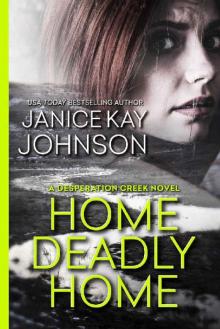 Home Deadly Home
Home Deadly Home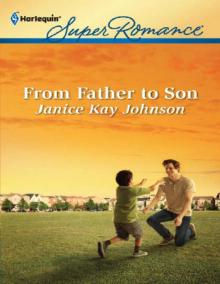 From Father to Son
From Father to Son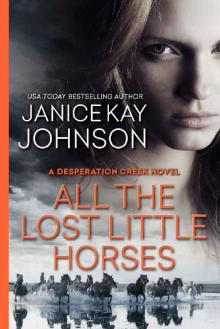 All the Lost Little Horses (A Desperation Creek Novel Book 2)
All the Lost Little Horses (A Desperation Creek Novel Book 2)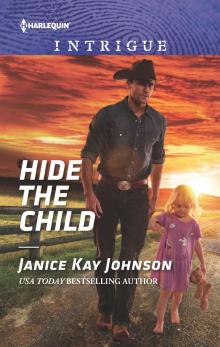 Hide the Child
Hide the Child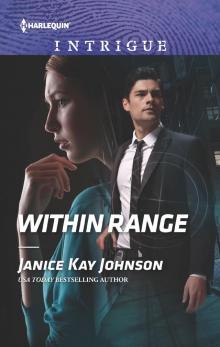 Within Range
Within Range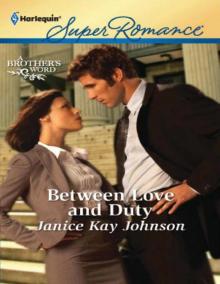 Between Love and Duty
Between Love and Duty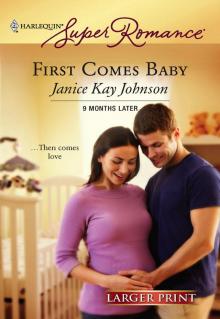 First Comes Baby
First Comes Baby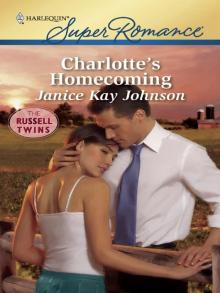 Charlotte's Homecoming
Charlotte's Homecoming In A Heartbeat (HQR Superromance)
In A Heartbeat (HQR Superromance)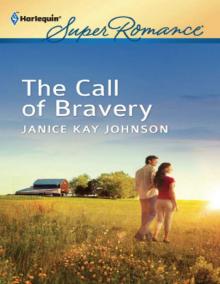 The Call of Bravery
The Call of Bravery In Hope's Shadow
In Hope's Shadow Anything for Her
Anything for Her Harlequin Superromance September 2014 - Bundle 1 of 2: This Good ManPromises Under the Peach TreeHusband by Choice
Harlequin Superromance September 2014 - Bundle 1 of 2: This Good ManPromises Under the Peach TreeHusband by Choice The Baby Agenda
The Baby Agenda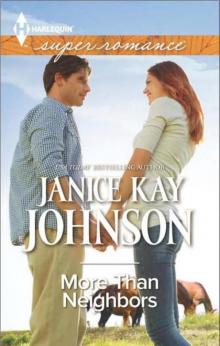 More Than Neighbors
More Than Neighbors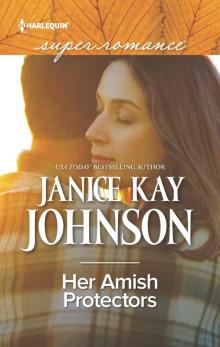 Her Amish Protectors
Her Amish Protectors All That Remains
All That Remains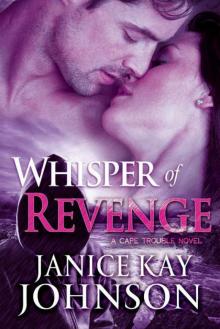 Whisper of Revenge (A Cape Trouble Novel Book 4)
Whisper of Revenge (A Cape Trouble Novel Book 4)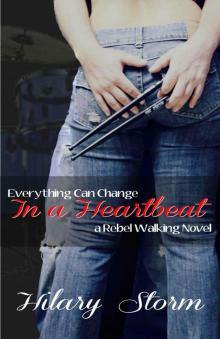 In a Heartbeat
In a Heartbeat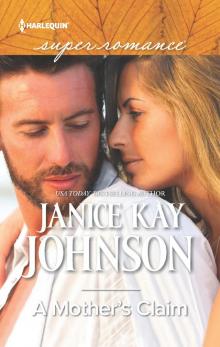 A Mother's Claim
A Mother's Claim Because of a Girl
Because of a Girl Back Against the Wall
Back Against the Wall Dangerous Waters
Dangerous Waters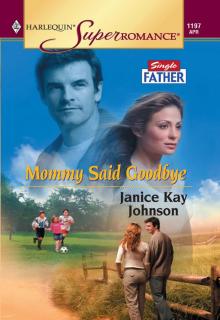 Mommy Said Goodbye
Mommy Said Goodbye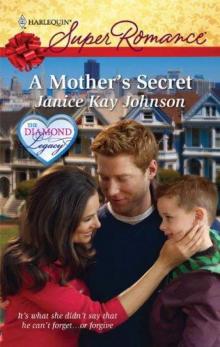 A Mother's Secret
A Mother's Secret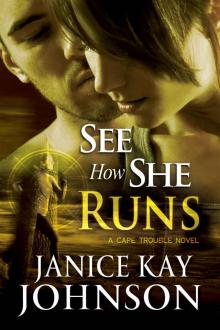 See How She Runs (A Cape Trouble Novel Book 2)
See How She Runs (A Cape Trouble Novel Book 2) Plain Refuge
Plain Refuge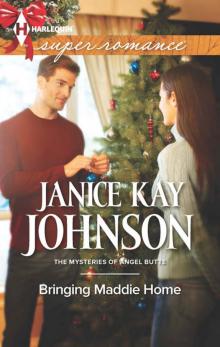 Bringing Maddie Home
Bringing Maddie Home For the Girls' Sake
For the Girls' Sake Through the Sheriff's Eyes
Through the Sheriff's Eyes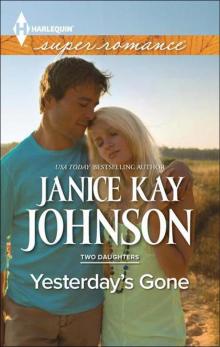 Yesterday's Gone (Two Daughters Book 1)
Yesterday's Gone (Two Daughters Book 1)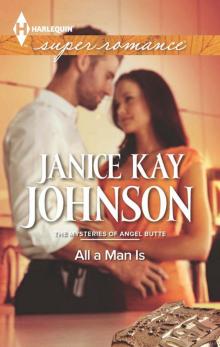 All a Man Is
All a Man Is Harlequin Superromance January 2014 - Bundle 1 of 2: Everywhere She GoesA Promise for the BabyThat Summer at the Shore
Harlequin Superromance January 2014 - Bundle 1 of 2: Everywhere She GoesA Promise for the BabyThat Summer at the Shore No Matter What
No Matter What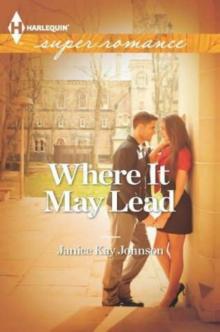 Wakefield College 01 - Where It May Lead
Wakefield College 01 - Where It May Lead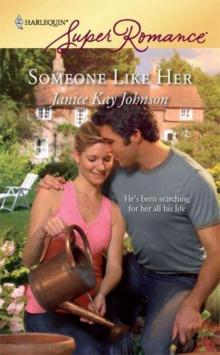 Someone Like Her
Someone Like Her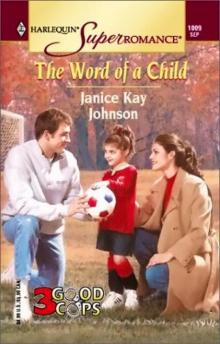 THE WORD OF A CHILD
THE WORD OF A CHILD Harlequin Superromance May 2016 Box Set
Harlequin Superromance May 2016 Box Set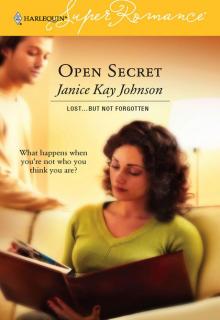 Open Secret
Open Secret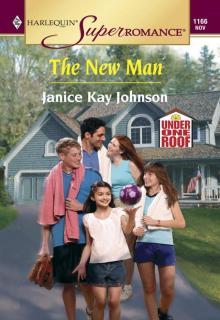 The New Man
The New Man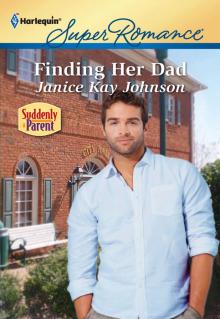 Finding Her Dad
Finding Her Dad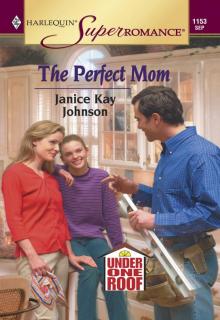 The Perfect Mom
The Perfect Mom All Through The House
All Through The House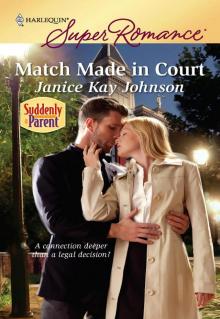 Match Made in Court
Match Made in Court Making Her Way Home
Making Her Way Home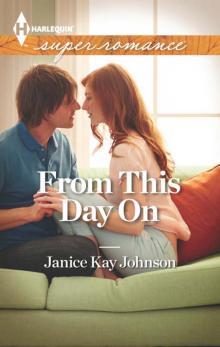 From This Day On
From This Day On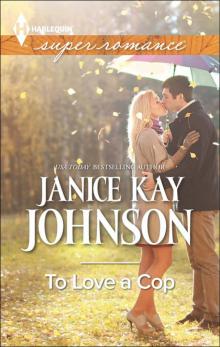 To Love a Cop
To Love a Cop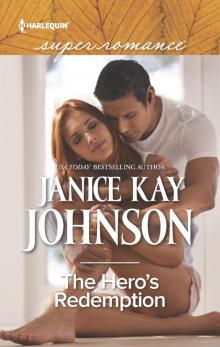 The Hero's Redemption
The Hero's Redemption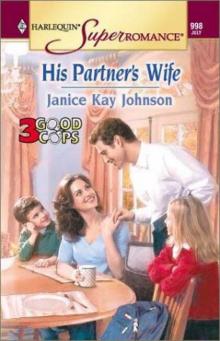 HIS PARTNER'S WIFE
HIS PARTNER'S WIFE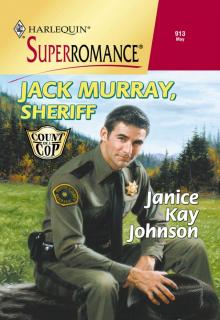 Jack Murray, Sheriff
Jack Murray, Sheriff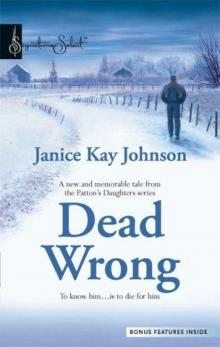 Dead Wrong
Dead Wrong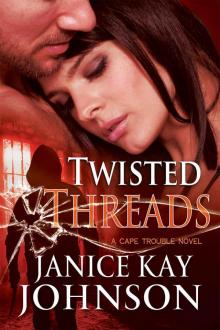 Twisted Threads (A Cape Trouble Novel Book 3)
Twisted Threads (A Cape Trouble Novel Book 3)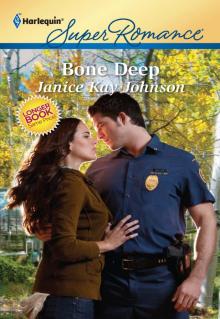 Bone Deep
Bone Deep The Closer He Gets
The Closer He Gets With Child
With Child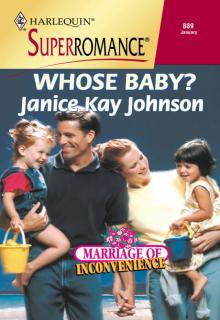 Whose Baby?
Whose Baby? Kids by Christmas
Kids by Christmas